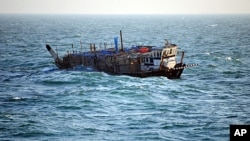For the second time in a week, the U.S. military says its forces in the Persian Gulf region have come to the rescue of Iranian sailors aboard a distressed vessel.
The latest rescue of Iranians at sea comes as the Pentagon seeks to publicize the good that U.S. forces do while patrolling the Persian Gulf region.
Pentagon spokesman George Little said Tuesday that the crew of a U.S. Coast Guard cutter rescued the mariners after getting distress signals from the Iranian cargo vessel Ya-Hussayn.
"It was hailed by flares and flashlights from the Iranian cargo dhow and the dhow's master requested assistance from the cutter indicating that the engine room was flooding and deemed not seaworthy," said Little.
The U.S. Navy says the U.S. Coast Guard transferred the Iranian crewmembers to safety aboard the U.S. cutter Monomoy. A Navy statement quotes the owner of the Iranian vessel as thanking the U.S. seamen for rescuing the sailors, saying that without the Americans' help, they would be dead.
It was the second time in a week the Pentagon has reported the rescue of Iranian seafarers by U.S. ships. Last Thursday, the U.S. Navy rescued 13 Iranian fishermen who had been captured by Somali pirates in the northern Arabian Sea.
U.S. military officials say such rescues happen on an almost daily basis anywhere in the world where American warships are on patrol. The Pentagon, however, is lately calling attention to those involving Iranian nationals, especially as tensions rise between Iran and Washington over the presence of U.S. forces in the region.
Iran last week warned the United States not to return a nuclear-powered U.S. aircraft carrier to the Persian Gulf. Tehran recently conducted a series of war exercises at sea and threatened to shut down the Strait of Hormuz, a move that could disrupt world oil supplies.
U.S. defense officials rejected the warning and American ships continue to patrol the area.
Iran has increased its anti-American rhetoric in the past few weeks, as new economic sanctions start to bite on the country. The United States has added tough new restrictions on doing business with Iran, as part of an effort to push Tehran to abandon its nuclear programs, which Washington suspects are being used to create a nuclear bomb.
European nations also may add sanctions, since Iran refuses to give up its nuclear program, which it says is for civilian use only.












